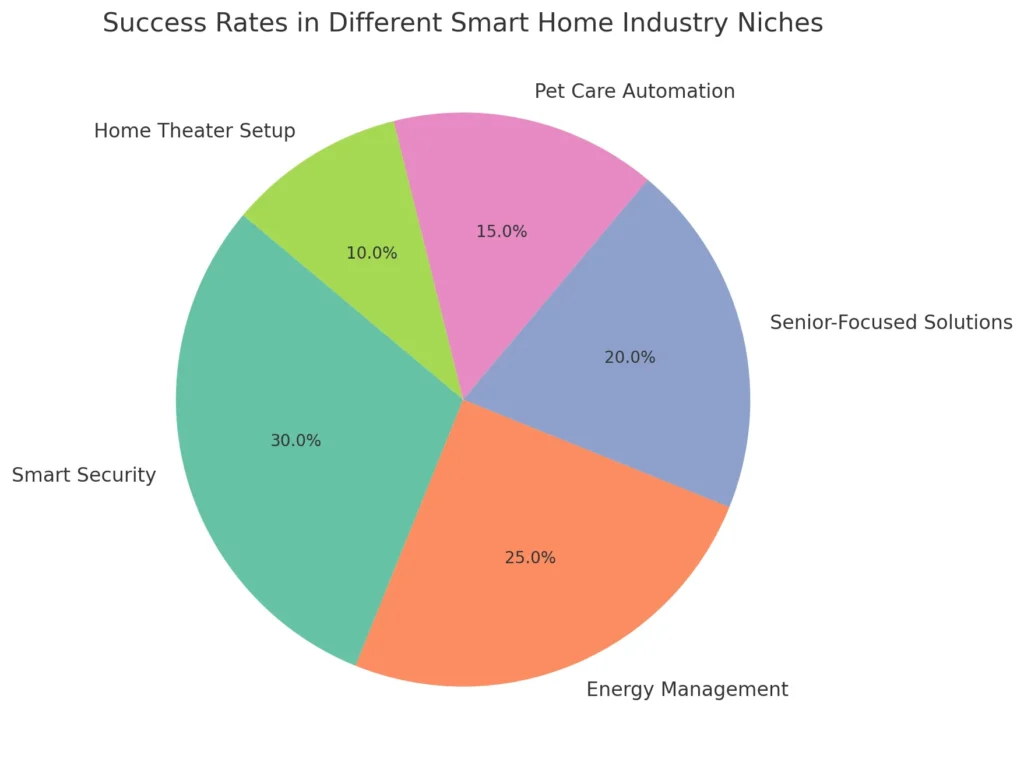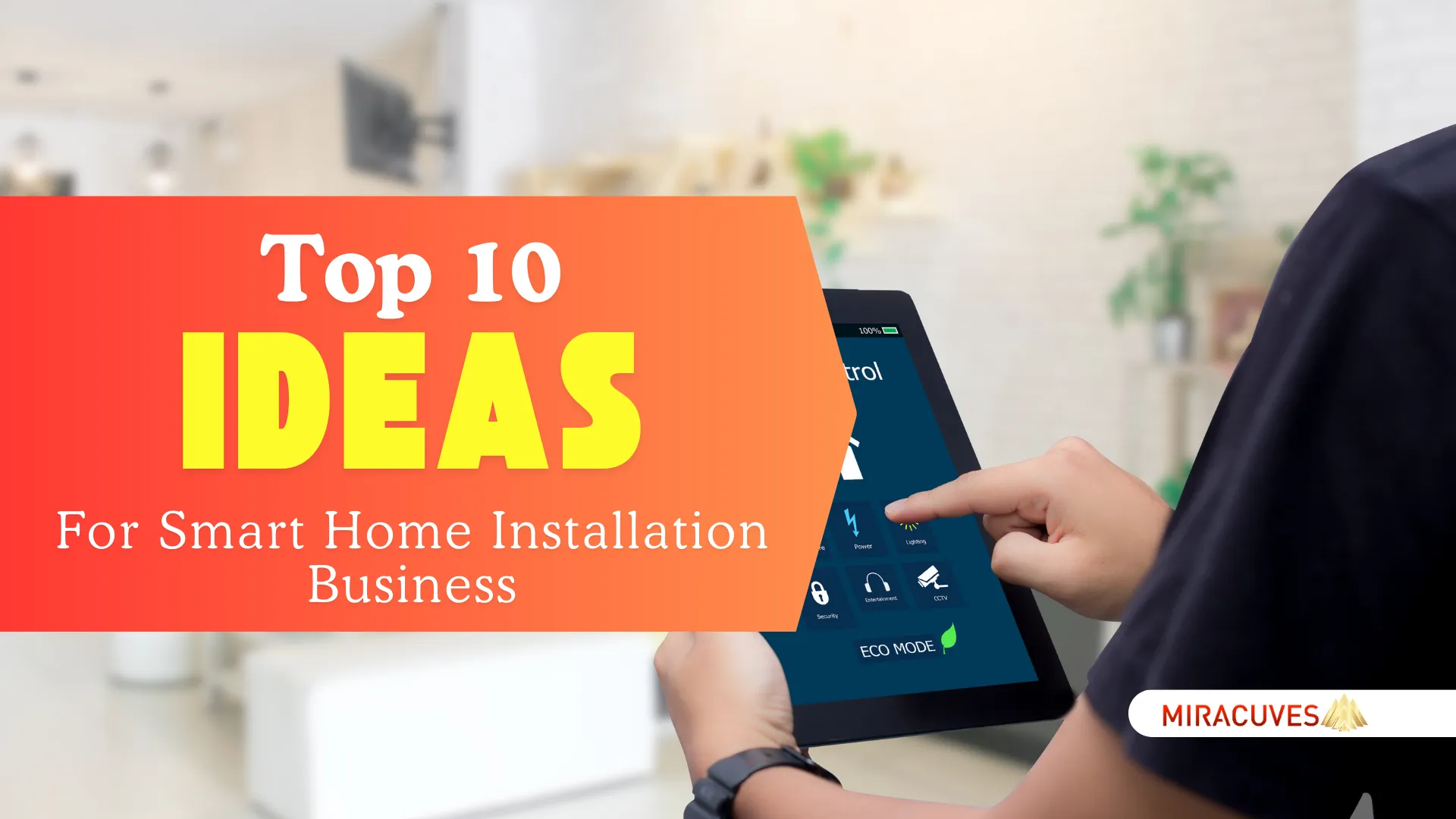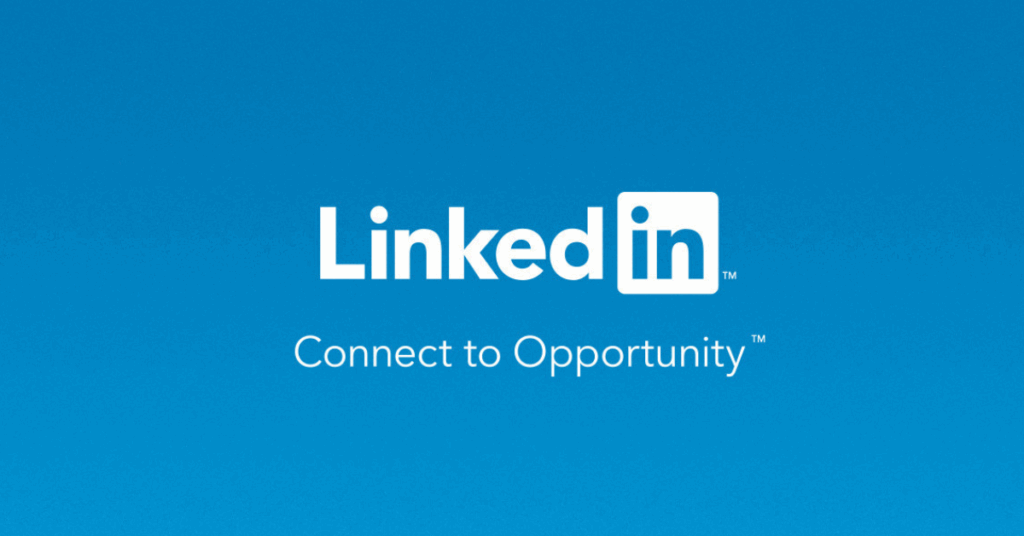In today’s fast-paced digital world, smart homes have gone from futuristic dreams to everyday realities. With more people seeking convenience, security, and energy efficiency in their living spaces, the smart home industry is booming. This growth has opened doors for entrepreneurs interested in launching smart home installation businesses, presenting exciting opportunities for those who want to innovate in a high-demand market. In fact, as the demand for connected devices and home automation increases, smart home solutions are projected to become essential in modern households.
| Metric | Value |
|---|---|
| Global Smart Home Market Size | $79.5 billion (2024) |
| Annual Growth Rate | 27.07% |
| Projected Market Size (2030) | $314 billion |
| Most Popular Categories | Security, Lighting, Energy |
| Average Smart Device Adoption Rate | 55% in developed markets |
Why Choose the Smart Home Installation Industry?
The smart home installation industry is not just a trend; it’s a rapidly evolving field with immense growth potential. As technology continues to shape daily life, more homeowners are investing in smart devices to enhance security, convenience, and energy efficiency. This surge in demand has made the smart home industry an ideal space for startups, offering entrepreneurs a chance to tap into a booming market with endless possibilities.
A key driver behind this growth is the increasing need for smart security systems, automated lighting, and energy-saving solutions, which not only appeal to tech-savvy homeowners but also align with sustainable living goals. Additionally, smart home technology is no longer exclusive to luxury homes—affordable devices and DIY options have made smart upgrades accessible to a broader audience. This trend indicates a shift where smart homes are becoming the standard, making this industry ripe for new businesses to flourish.
Current Trends and Future Opportunities in the Smart Home Industry
The smart home industry is buzzing with exciting trends and groundbreaking technologies, setting the stage for future innovations. At the heart of this shift is the push for seamless integration, where smart home devices communicate effortlessly with each other and are controlled from a single, unified platform. This trend has led to the rise of smart hubs and voice assistants, making home automation more intuitive and user-friendly than ever.
| Trend/Technology | Description | Impact on Market |
|---|---|---|
| Smart Hubs & Voice Assistants | Devices that unify control of various smart home systems | Enhanced user convenience and integrated experience |
| Energy-Efficient Solutions | Smart thermostats, lighting, and water-saving devices | Reduced utility costs and appeal to eco-conscious buyers |
| Health Monitoring Technologies | Air quality monitors, allergen detectors, wellness tracking | Growing demand for wellness-focused living environments |
| Artificial Intelligence (AI) | Predictive systems that learn user preferences | Highly personalized smart home experiences |
Another key trend shaping the industry is the focus on sustainability. Homeowners are increasingly looking for smart devices that reduce energy consumption, such as intelligent thermostats, smart lighting systems, and water management tools. These energy-saving technologies not only contribute to lower utility bills but also appeal to environmentally conscious consumers, positioning smart home solutions as a win-win for savings and sustainability.
Looking forward, the industry is poised for growth in health-focused smart technologies. Devices that monitor air quality, detect allergens, and track overall household health metrics are gaining traction, responding to a growing demand for wellness-oriented living spaces. Future opportunities also lie in artificial intelligence and machine learning, which will enable smart home systems to predict user preferences and create personalized living experiences.
Top 10 Ideas for Smart Home Installation Business Startups
The smart home industry offers a wide variety of business opportunities that cater to different customer needs and investment levels. Here are ten lucrative business ideas for aspiring entrepreneurs in the smart home installation space:
| Business Idea | Startup Cost | Target Market | Profit Potential |
|---|---|---|---|
| Smart Security System Installation | Medium | Residential and commercial property owners | High |
| Home Automation Consulting | Low | New homeowners, real estate developers | Medium |
| Energy Management Solutions | Medium | Eco-conscious consumers, businesses | High |
| Voice-Control Integration Services | Low to Medium | Tech enthusiasts, modern households | Medium |
| Health Monitoring Installations | Medium | Families, health-conscious individuals | High |
| Smart Lighting Solutions | Low to Medium | Residential and commercial spaces | Medium |
| Customized Smart Home Theaters | High | Luxury homeowners, tech-savvy families | High |
| Smart Appliance Integration | Medium | Busy families, modern households | Medium |
| Pet Care Automation | Low to Medium | Pet owners | Medium |
| Senior-Friendly Smart Home Solutions | Medium | Elderly individuals, families with senior members | High |
1. Smart Security System Installation
Offer installation services for smart security systems, catering to the high demand for enhanced home security.
- Target Market: Residential and commercial property owners
- Estimated Costs: Medium (equipment, licensing, training)
- Startup Requirements: Knowledge of security protocols, licensing, familiarity with top security tech brands
2. Home Automation Consulting
Guide clients on selecting and setting up smart home devices tailored to their specific needs.
- Target Market: New homeowners, real estate developers
- Estimated Costs: Low (primarily marketing and basic setup tools)
- Startup Requirements: Expertise in smart home devices, strong communication skills
3. Energy Management Solutions
Install energy-saving devices like smart thermostats and lighting systems, appealing to eco-conscious consumers.
- Target Market: Eco-conscious consumers, businesses
- Estimated Costs: Medium (energy-saving equipment)
- Startup Requirements: Knowledge of energy-saving products, installation experience
4. Voice-Control Integration Services
Integrate voice-controlled devices such as Alexa or Google Home with other smart systems, meeting demand for hands-free automation.
- Target Market: Tech enthusiasts, modern households
- Estimated Costs: Low to medium (device testing, setup tools)
- Startup Requirements: Familiarity with voice assistants and device compatibility
5. Health Monitoring Installations
Install health-monitoring devices like air quality monitors and allergen detectors, catering to health-conscious households.
- Target Market: Families, health-conscious individuals
- Estimated Costs: Medium (health-monitoring devices)
- Startup Requirements: Understanding of health-focused tech, installation skills
6. Smart Lighting Solutions
Provide installation of smart lighting for convenience and energy savings in homes and commercial spaces.
- Target Market: Residential and commercial clients
- Estimated Costs: Low to medium (lighting kits, installation tools)
- Startup Requirements: Basic electrical knowledge, familiarity with smart lighting brands
7. Customized Smart Home Theaters
Design and install customized home theaters, providing an immersive entertainment experience.
- Target Market: Luxury homeowners, tech-savvy families
- Estimated Costs: High (high-end audio-visual equipment, installation)
- Startup Requirements: Audio-visual expertise, understanding of premium equipment
8. Smart Appliance Integration
Connect various smart appliances like refrigerators and ovens into a unified home system for added convenience.
- Target Market: Busy families, modern households
- Estimated Costs: Medium (integration tools, demo devices)
- Startup Requirements: Knowledge of smart appliance integration techniques
9. Pet Care Automation
Install devices for automated pet feeding, monitoring, and play, catering to pet owners looking for convenient pet care.
- Target Market: Pet owners
- Estimated Costs: Low to medium (pet tech devices)
- Startup Requirements: Familiarity with pet care automation products, basic tech skills
10. Senior-Friendly Smart Home Solutions
Set up aging-in-place technologies like fall detection, emergency alerts, and health monitoring for elderly care.
- Target Market: Elderly individuals, families with senior members
- Estimated Costs: Medium (senior-friendly devices)
- Startup Requirements: Knowledge of senior-friendly technologies, accessibility standards
Read More ‘Top 10 Ideas for Home Organization Business Startups”
Real-World Examples
The success of smart home businesses can be seen in the real-world growth of companies that specialize in these services. Startups and small businesses are making their mark by addressing specific customer needs, such as tailored smart security, energy management, and senior-friendly home solutions. For instance, companies focusing on eco-friendly energy solutions have seen increased demand due to rising energy costs and environmental awareness. By providing smart thermostats, automated blinds, and other energy-saving installations, these businesses are achieving profitable growth while appealing to a wide customer base.

Similarly, businesses that offer senior-focused smart home solutions are thriving as they address safety and health needs in a way that resonates with both seniors and their families. These companies often install fall-detection systems, emergency response features, and voice-activated devices, providing seniors with safety and convenience. The rising trend of aging in place means more families are investing in these services, making it a highly viable market.
In addition, companies specializing in pet care automation are also seeing steady growth. Automated feeders, pet cameras, and smart pet doors provide pet owners with peace of mind, meeting the unique needs of pet-loving households. The success of businesses in these niches underscores the value of choosing a specific focus within the smart home industry.
Mistakes to Avoid When Starting a Smart Home Installation Business
Entering the smart home installation business offers great potential, but success requires avoiding common pitfalls. Here are key mistakes to watch out for and ways to prevent them.
| Mistake | Preventive Measure |
|---|---|
| Underestimating Market Research | Conduct thorough research on customer demographics, local competition, and current market trends. |
| Failing to Keep Up with Technology | Regularly update knowledge through training and stay informed on latest smart home tech advancements. |
| Overlooking Customer Education | Provide clear usage instructions, helpful guides, and follow-up support to ensure customer satisfaction. |
| Ignoring Security and Privacy Aspects | Implement secure setups, educate clients on cybersecurity practices, and suggest strong network protection. |
| Overextending with High Startup Costs | Start with a few high-demand services and scale up gradually to manage financial risks. |
1. Underestimating Market Research Needs
Many startups dive into the business without fully understanding customer needs or the specific demands of their chosen niche. Thorough market research helps clarify the most in-demand services, ensuring you align with market expectations. Avoid this by analyzing customer demographics, local competition, and current market trends.
2. Failing to Keep Up with Technology
The smart home industry is rapidly evolving, with frequent updates in software and hardware. Falling behind can make your services seem outdated and less appealing. To stay competitive, regularly update your knowledge and invest in training to keep up with the latest smart home technologies and trends.
3. Overlooking Customer Education
For many customers, smart home technology is still new and can be complex to understand. Failing to guide and educate them on usage, maintenance, and security of smart devices can lead to dissatisfaction. Prevent this by providing clear instructions, helpful guides, and even follow-up support to ensure customers feel confident with their new systems.
4. Ignoring Security and Privacy Aspects
As smart devices connect to the internet, privacy and security concerns arise. Neglecting to address these concerns can lead to trust issues and even liability risks. Make it a priority to include secure setups, educate clients on safe usage practices, and suggest strong cybersecurity options to protect their networks.
5. Overextending with High Startup Costs
Starting with too many services or expensive equipment can strain finances before the business gains traction. To avoid this, focus initially on a few high-demand services and scale up as you grow. This approach minimizes financial risks and allows you to build expertise gradually.
Why Trust Miracuves Solutions for Your Next Project?
When embarking on a smart home installation project, you want a trusted partner who understands the latest technology, has proven expertise, and is committed to your success. Miracuves Solutions stands out as a leading choice, providing tailored smart home solutions designed to fit individual needs, budgets, and lifestyle preferences. Our team brings deep experience in smart home installations, from energy-saving systems to advanced security solutions, ensuring that each project is both innovative and reliable.
At Miracuves Solutions, we prioritize customer satisfaction and take pride in offering complete support—from initial consultation to post-installation assistance. Our projects are built around customer education, cybersecurity, and long-term value, so you can feel confident that your smart home is in capable hands. By choosing us, you’re not only getting a service but a partnership that will empower you to enjoy the full benefits of smart living.
Let Miracuves Solutions guide you into the future of home automation with expertise, dedication, and a focus on lasting impact.
Conclusion
Stepping into the smart home installation business opens up a world of possibilities, from improving daily convenience to enhancing energy efficiency and security for customers. As this industry continues to grow and evolve, there’s no better time to dive in and carve out a unique space in the market. By choosing the right niche, staying updated on trends, and focusing on customer satisfaction, you can create a successful and rewarding business.
Whether you’re inspired by energy management solutions, smart security systems, or even senior-friendly setups, the opportunities in smart home technology are vast and promising. With careful planning and dedication, your smart home business startup can not only thrive but make a positive impact on modern living.
FAQs
What skills are needed to start a smart home installation business?
Knowledge of smart devices, basic wiring, networking, and good communication skills are essential to help customers understand and use their smart systems.
How much does it cost to start a smart home installation business?
Startup costs vary based on the services offered but can range from low to medium. Initial investments usually cover essential equipment, training, and marketing.
Which smart home services are most in demand?
Top services include smart security systems, energy-saving installations, voice control integration, and health monitoring technologies, as they address core needs like safety, convenience, and cost savings.
How can I stand out in the smart home industry?
Focus on customer education, offer tailored solutions, and stay updated with the latest technology trends to provide clients with the most value.
Are smart home installation businesses profitable?
Yes, with increasing demand for home automation, these businesses can be very profitable, especially if focused on high-demand services with strong customer support.







